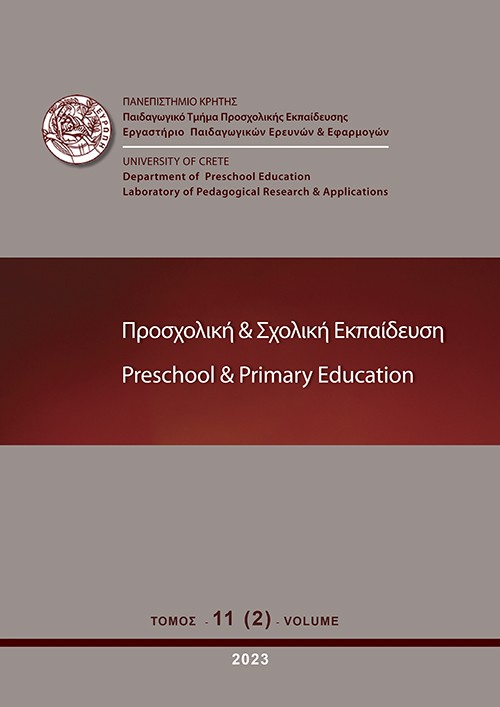Aggregate data for the number of students enrolled in the inclusion classes of primary and secondary education from 2017 to 2021
Abstract
The majority of students with disabilities and/or special education needs in Greece enrolled in inclusion classes leave their mainstream classrooms to cooperate with qualified teachers who implement intervention programmes in another classroom for up to 15 hours per week (common and specialized programmes), while a small percentage is supported more than 15 hours per week (extended program). The type of programme is decided by the public service in charge called ‘Centers of Interdisciplinary Assessment, Counseling and Support’ (CIACS). Students without a formal statement of special educational needs and/or disabilities can also be enrolled in inclusion classes at the suggestion of the teachers. This study initially examined the number of students with and/or without a formal statement of special education need and/or disabilities enrolled in Greek inclusion classes from 2017 to 2021. Afterwards, the study focused on the number of students who attended either a ‘common and specialized program’ or an ‘extended program’. All the data were provided by the Greek Ministry of Education and Religious Affairs. The results revealed a statistically significant decrease during the last two school years in the total number of the enrolled students, in the number of students with a formal statement of special educational needs and/or disabilities, as well as in the number of the students who attended the common and specialized programmes. Finally, there was a significant decrease in the number of students who attended the extended programme in primary education in the two last years, while the number of students in secondary education fluctuated. The findings raise concerns about the evolution of inclusion classes, which are reported to be crucial for inclusive education policy in Greece. More specifically, the observed decrease in the number of students in the last two years, regardless of the educational level enrolled or the existence of formal statement of disability and/or special educational needs, may indicate the reluctance of more and more students to leave the mainstream classroom. However, such an argument is particularly precarious due to the changes in the daily school attendance caused by the COVID-19 pandemic. Therefore, it would be very useful to study this trend in the near future to ascertain if the hypothesis is correct. On the other hand, the pull-out from the mainstream classroom for many hours per week, which may exceed 50% of the weekly schedule for a small but not insignificant percentage of students enrolled, indicated that conservative models which correspond more to integration rather than inclusion have prevailed in Greek education. Such an approach is anachronistic and it might be the right time to start a debate on the need for a progressive change that will focus on the systematic implementation of differentiated instruction, as well as the provision of in-class support when necessary.
Article Details
- How to Cite
-
Papadimitriou, V. (2023). Aggregate data for the number of students enrolled in the inclusion classes of primary and secondary education from 2017 to 2021. Preschool and Primary Education, 11(2), 318–334. https://doi.org/10.12681/ppej.29613
- Section
- Articles

This work is licensed under a Creative Commons Attribution-NonCommercial-ShareAlike 4.0 International License.
Authors who publish with this journal agree to the following terms:
- Authors retain copyright and grant the journal right of first publication with the work simultaneously licensed under a Creative Commons Attribution Non-Commercial License that allows others to share the work with an acknowledgement of the work's authorship and initial publication in this journal.
- Authors are able to enter into separate, additional contractual arrangements for the non-exclusive distribution of the journal's published version of the work (e.g. post it to an institutional repository or publish it in a book), with an acknowledgement of its initial publication in this journal.
- Authors are permitted and encouraged to post their work online (preferably in institutional repositories or on their website) prior to and during the submission process, as it can lead to productive exchanges, as well as earlier and greater citation of published work (See The Effect of Open Access).



